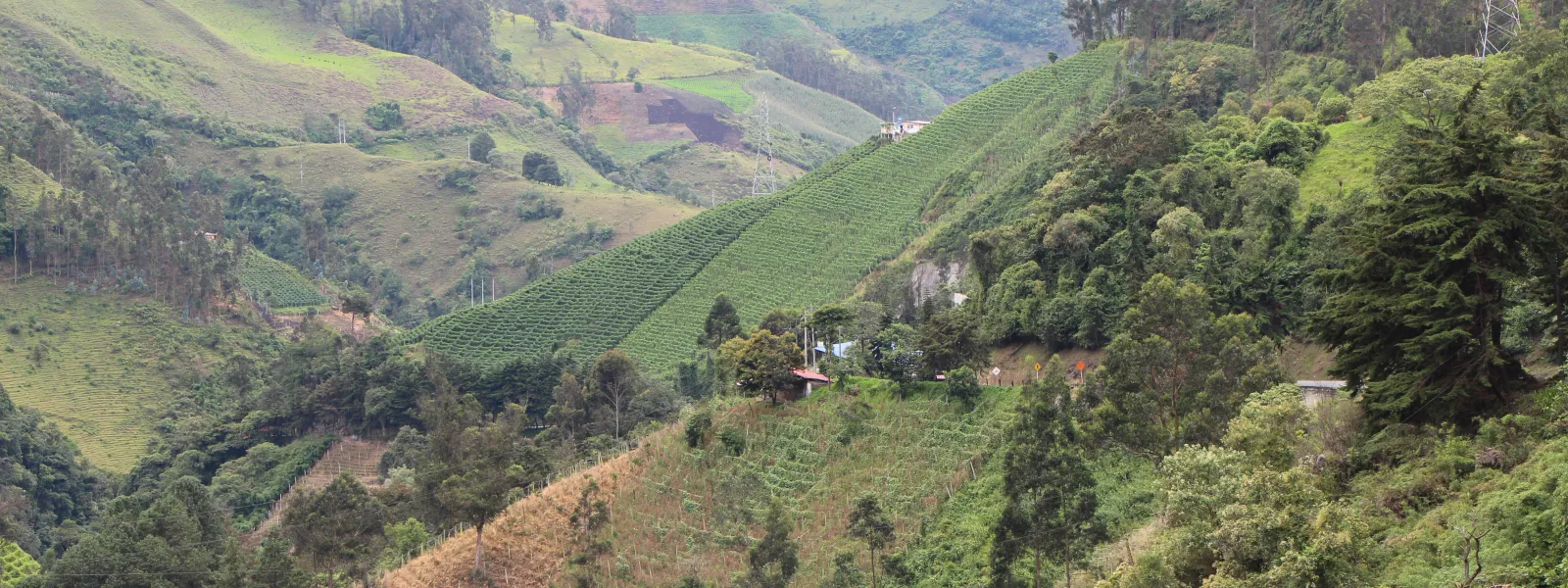
Project
Photo: Andrés Ángel / AIDASupporting Cajamarca’s fight to defend its territory from mining
Cajamarca is a town in the mountains of central Colombia, often referred to as "Colombia’s pantry” due to its great agricultural production. In addition to fertile lands, fed by rivers and 161 freshwater springs, the municipality features panoramic views of gorges and cloud forests. The main economic activities of its population—agriculture and tourism—depend on the health of these natural environments.
The fertile lands of Cajamarca are also rich in minerals, for which AngloGold Ashanti has descended on the region. The international mining conglomerate seeks to develop one of the world’s largest open-pit gold mines in the area. Open-pit mining is particularly damaging to the environment as extracting the metal involves razing green areas and generating huge amounts of potentially toxic waste
The project, appropriately named La Colosa, would be the second largest of its kind in Latin America and the first open-pit gold mine in Colombia. The toxic elements that an operation of that magnitude would leave behind could contaminate the soil, air, rivers and groundwater.
In addition, storms, earthquakes, or simple design errors could easily cause the dams storing the toxic mining waste to rupture. The collapse of similar tailings dams in Peru and Brazil in recent years has caused catastrophic social and environmental consequences.
On March 26, 2017, in a popular referendum, 98 percent of the voters of Cajamarca said “No” to mining in their territory, effectively rejecting the La Colosa project. AIDA is proud to have contributed to that initiative. But even with this promising citizen-led victory, much work remains.
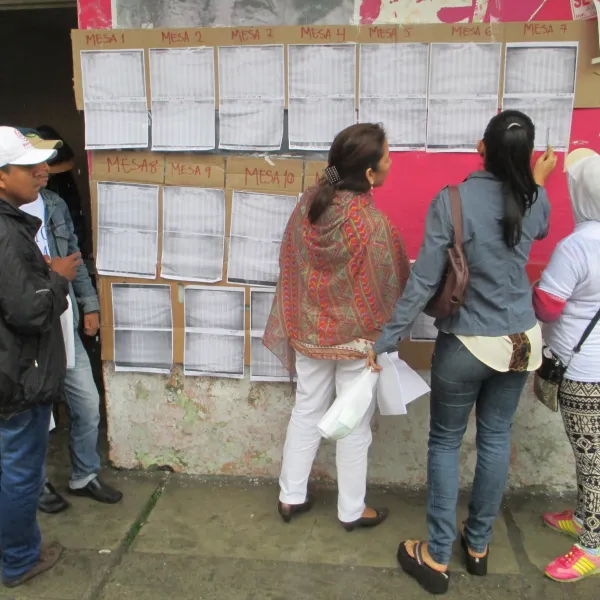
Related projects
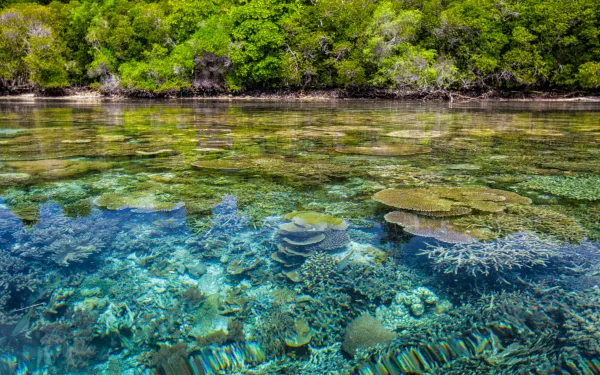
In historic decree, Costa Rica legally protects its corals
On the occasion of World Oceans Day, Costa Rica issued a decree to protect its vast coral ecosystems. We congratulate the government for taking this important step and setting a legal precedent for the protection of marine environments in the region. San José, Costa Rica. The Costa Rican government issued a precedent-setting decree today that legally protects its vast coral ecosystems from harmful human activities. Following years of work on the issue, the Interamerican Association for Environmental Defense (AIDA) and Conservation International celebrate this important instrument for the conservation of these fragile and vital marine environments. “We are very pleased with this advance, promoted by the Vice Ministry of Water and Seas, which guarantees the survival of coral reefs and the various species that contribute to their conservation—species like the parrotfish, which feed on the algae that can deprive reefs of oxygen,” said Gladys Martínez, senior attorney of AIDA’s Marine Biodiversity and Coastal Protection Program. The decree provides a series of measures the government must adopt in order to preserve reef ecosystems and the species that depend on them, threatened by a combination of unsustainable use, climate change, inadequate management, and invasive species. The measures include: the creation and implementation of science-based strategies and policies to confront the effects of climate change; and the restoration of degraded reefs. The law also prohibits harmful activities like the extraction and commercialization of reefs, dumping of waste, and anchoring. “It’s our hope that the legal precedent established by this decree will be replicated in other countries of the Americas that, like Costa Rica, are bound by international treaties to safeguard their corals,” said Magie Rodríguez, AIDA attorney. “In the coming years, we will be closely monitoring the decree’s implementation.” In 2012, AIDA and Conservation International joined forces with national experts to prepare a report detailing the economic and environmental benefits of corals, urging the creation of legislation in Costa Rica to protect them. AIDA also supported the Vice Ministry in the preparation of the decree based on the organization’s experience in international law and understanding of regulations in other countries of the region. “Costa Rica is a nation privileged by the dimensions of its marine spaces and biodiversity. The coral systems are incredibly productive, but they are also threatened by human activity and climate change,” said Marco A. Quesada Alpízar, director of Conservation International - Costa Rica. “By taking action on this issue, Costa Rica has assumed responsibility for the conservation and management of its marine ecosystems, and has set an example that can be replicated in other countries.” The decree answers a years-long call for Costa Rica to comply with international obligations and protect its threatened marine ecosystems. Scientific studies have shown that a large part of the coral reefs in the country are at great risk due to human activities including land-based pollution and destructive fishing practices. Their conservation must be a priority. “This decree fills an important gap in the regulation of coral reefs in Costa Rica. It recognizes, once again, that marine resources provide people with services and well-being, which requires they be adequately protected and managed,” explained Quesada. “Costa Rica is globally recognized for its ecotourism and natural richness,” added Ana Gloria Guzmán of Conservation International’s Oceans Center. “With this decree, the nation is setting an example about the protection and management of essential marine ecosystems as a means to ensure the health of the oceans and safeguard the well-being of coastal communities that depend on the services they provide.” press contacts: Victor Quintanilla, AIDA, +521 5570522107, [email protected] Kipp Lanham, Conservation International, (202) 412-5533, [email protected] Marco Quesada, Conservation International, +506 2253-0500 ext. 139, [email protected]
Read more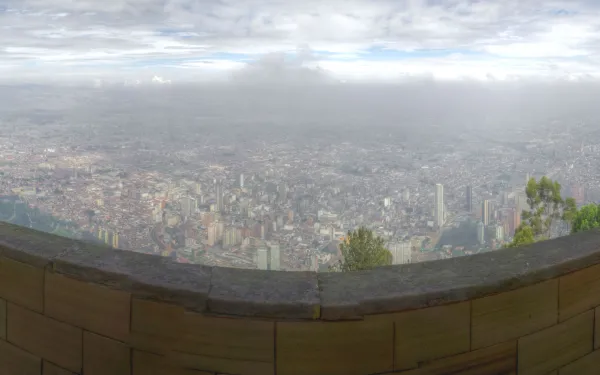
Clean air should be a human right, says UN Special Rapporteur
Even on a clear day in Bogotá, the air pollution can be so overwhelming that the sky is cast in a foggy, washed out haze that hangs over the city. In Bogotá—as in many cities across the Americas—air pollution has become a part of daily life. But it shouldn’t have to be that way. In a recent report, David Boyd, the UN Special Rapporteur on human rights and the environment said that breathing clean air should be considered a human right. While the majority of countries around the world have recognized the right to a healthy environment, the right to clean air does not yet enjoy the same level of global recognition. Air pollution is a dual killer: not only is it one of the biggest risks to public health worldwide, airborne pollutants also exacerbate the climate crisis. States and the human rights community, therefore, must incorporate the Rapporteur’s recommendations into law, because tackling air pollution is the best thing we can do to improve public health while also saving the planet. Air pollution: a dual killer More than six billion people, including two billion children around the world, are breathing air that adversely affects their health, according to the World Heath Organization (WHO). The effects of ambient and household air pollution cause roughly 7 million premature deaths worldwide each year, more than 300 thousand of which occur in the Americas alone. Hundreds of millions of people around the world suffer from illnesses caused by air pollution, which is considered one of the five leading factors contributing to non-communicable diseases like stroke, heart disease, chronic obstructive pulmonary disease, and cancer. Fine particulate matter like soot, black carbon, sulfates, nitrates and heavy metals all significantly increase the risk of these diseases. Moreover, air pollution disproportionately affects society’s most vulnerable populations. Children and the elderly are particularly affected by airborne pollutants, and suffer disproportionate impacts including illnesses and chronic breathing problems. Low income and poor communities, more often located near the sources of pollution—factories, power plants, and busy roads, among others—also suffer outsized health risks. Global air pollution is more than just a public health concern. Often, the same polluting activities that harm human health are also speeding up climate crisis. Research shows that black carbon—generated by burning fossil fuels, biofuels, and biomass—may accelerate snowmelt in glaciers, contributing to water insecurity and natural disasters. And methane, another short-lived climate pollutant, can trap up to 30 times more heat than CO2, speeding up global heating. Both issues amount to a costly problem. The World Bank estimates that global costs of air pollution will soon exceed $5 trillion per year, and says that unless countries curb global air pollution, air pollution-induced mortality could increase 50 to 100 percent by 2050. The economic benefits of slowing climate change will far outweigh the astronomical costs caused by flooding, more powerful storms, and crippling droughts, which could reach hundreds of billions of dollars by the end of the century, according to a report by the United States’ fourth National Climate Assessment. Respecting human rights While reducing air pollution makes good economic sense, curbing airborne pollutants is also a matter of respecting human rights. Besides violating the right to a clean and healthy environment, poor air quality can affect one’s right to life, health, water, food, housing and adequate standard of living, as well as the rights of the child, the UN report said. According to the Special Rapporteur, States should immediately devise action plans that: Monitor air quality and its impacts on human health; Assess sources of air pollution; Make information publicly available and release public health advisories; Establish air quality legislation, regulations, standards and policies; Develop air quality action plans at the local, nation, or regional level; Implement that air quality action plan and enforce its standards; and Evaluate progress and strengthen the plan to ensure the standards are met. Not only does this framework charge states with monitoring air quality, educating the public on air pollution, and making information accessible, it also urges States to establish strong, enforceable standards that will hold polluters accountable. Without those standards, improving air quality would be impossible. What’s more, States should apply the precautionary principle and use adequate margins of safety in order to protect society’s most vulnerable. Cities across Latin America are already starting to take air pollution seriously. Curitiba, Brazil, for example, built an extensive rapid bus system and, in 2013, launched an ambitious plan to add 300 kilometers of bicycle paths. Now, life expectancy in the city is two years longer than the national average, and the city has relatively low infant mortality, according to the WHO. In 2014, the Chilean government implemented a progressive tax on air pollution, taxing industry at higher rates in more densely populated areas to hold polluters accountable for their disproportionate impacts on urban populations. Although these examples show that change is possible, air pollution won’t be solved overnight, and States must begin establishing ambitious regulations to curb airborne contaminants. Otherwise, the world will continue coughing and sputtering into the 21st Century, as the impacts of climate crisis only continue to get worse.
Read more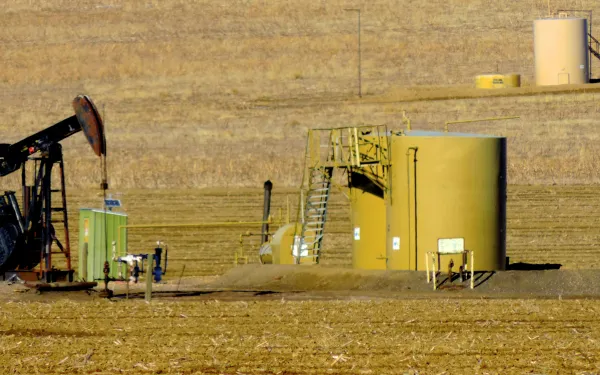
Is the UN finally turning against fracking?
The world is divided over the issue of fracking, a fact that is (at times painfully) apparent in the United Kingdom (UK) where I grew up. Four separate countries make up the UK. Of them, England is the only nation that still allows hydraulic fracturing; Scotland, Wales and Northern Ireland (along with a host of other countries worldwide) have banned the controversial process. Despite earthquakes linked to fracking in areas of the country where such things are virtually unheard of—plus waves of protests, controversy and opposition campaigns— the British government has so far refused to change its position. However, a recent United Nations recommendation to the UK may signal the beginning of the end for fracking in England and, hopefully, around the world. Fracking and the United Nations Until recently, the UN has appeared to have a complicated relationship with fracking. Several different UN bodies have made conflicting statements about the benefits of, and issues with, this means of energy production. In early 2018, the UN Conference on Trade and Development released a report that, according to one of its authors, did “not [say fracking] is good or bad,” but rather that each project’s cost/benefit analysis was dependent on a number of context-specific factors. The report cited positive aspects of fracking, calling it a useful “bridge fuel” for States aiming to move towards more environmentally-friendly renewable power sources, alongside it’s disadvantages. This argument is not viable since the environmental impact of hydraulic fracturing is even greater than that of conventional gas and oil exploitation. Over the last few months, however, it seems the UN has been hardening its position against fracking, particularly given its negative climate change impacts in the context of the Paris Agreement, the intergovernmental treaty in which nations have committed to taking ambitious steps to keep global warming below 1.5 degrees centigrade with respect to pre-industrial levels. Since October 2018, there have been 2 UN recommendations issued against fracking. In the UK, the government was urged to consider a complete and comprehensive ban on fracking; and in Argentina, the government was urged to reconsider the development of a large fracking project. The dangers of fracking Although for its promoters fracking has led to a huge spike in oil and gas production around the world—perhaps most notably in the US—its use has come at great environmental cost, particularly with regards to air quality and water supply due to the amount of water used in the process and its consequent contamination. Fracking releases large quantities of methane, a greenhouse gas whose global warming potential is 86 times greater than carbon dioxide over a 20-year period, according to the Intergovernmental Panel on Climate Change. In addition, the release of this gas can be hugely detrimental to the air quality surrounding fracking sites. Fracking also leads to increased earthquake risks due to the high pressure used to fracture layers of shale rock and extract oil and gas from it. In its recommendations to the UK and Argentina, the UN has clearly stressed the dangers of fracking. The key reason behind its recommendation to Argentina to reconsider the fracking project was its effect on climate change, especially in light of the Paris Agreement, and “the negative impact [that the project would have] on global warming and on the enjoyment of economic and social rights by the world’s population and future generations.” In its recommendation to the UK, it was noted that women in the UK are “disproportionately affected by the harmful effects of fracking, including exposure to hazardous and toxic chemicals, environmental pollution, and climate change.” Stopping the spread of fracking While operational in certain areas of the world, and being banned in others, fracking is advancing rapidly in Latin America. In the face of increasing global energy demand, it is crucial that the region, and the international community as a whole, commits to developing only truly sustainable energy projects. Fracking is not one. I believe the UN’s recent change in tone on fracking is a positive advance that should inspire both Argentina and the UK to react accordingly. From a personal point of view, I hope the UK heeds the growing evidence about the dangers of fracking and abandons the practice immediately. For Latin America, and other regions facing fracking’s blind advance, there are many countries to hold up as examples of how to confront the controversial practice. That’s why AIDA recently published a report highlighting the arguments and mechanisms that have been used around the world to restrict fracking and avoid its negative impacts on people and the environment. It is crucial that these impacts be properly considered as we take the ambitious steps needed to create an energy matrix that can solve the world’s energy needs without violating human rights, destroying our common goods, or worsening the catastrophic impacts of the climate crisis.
Read more